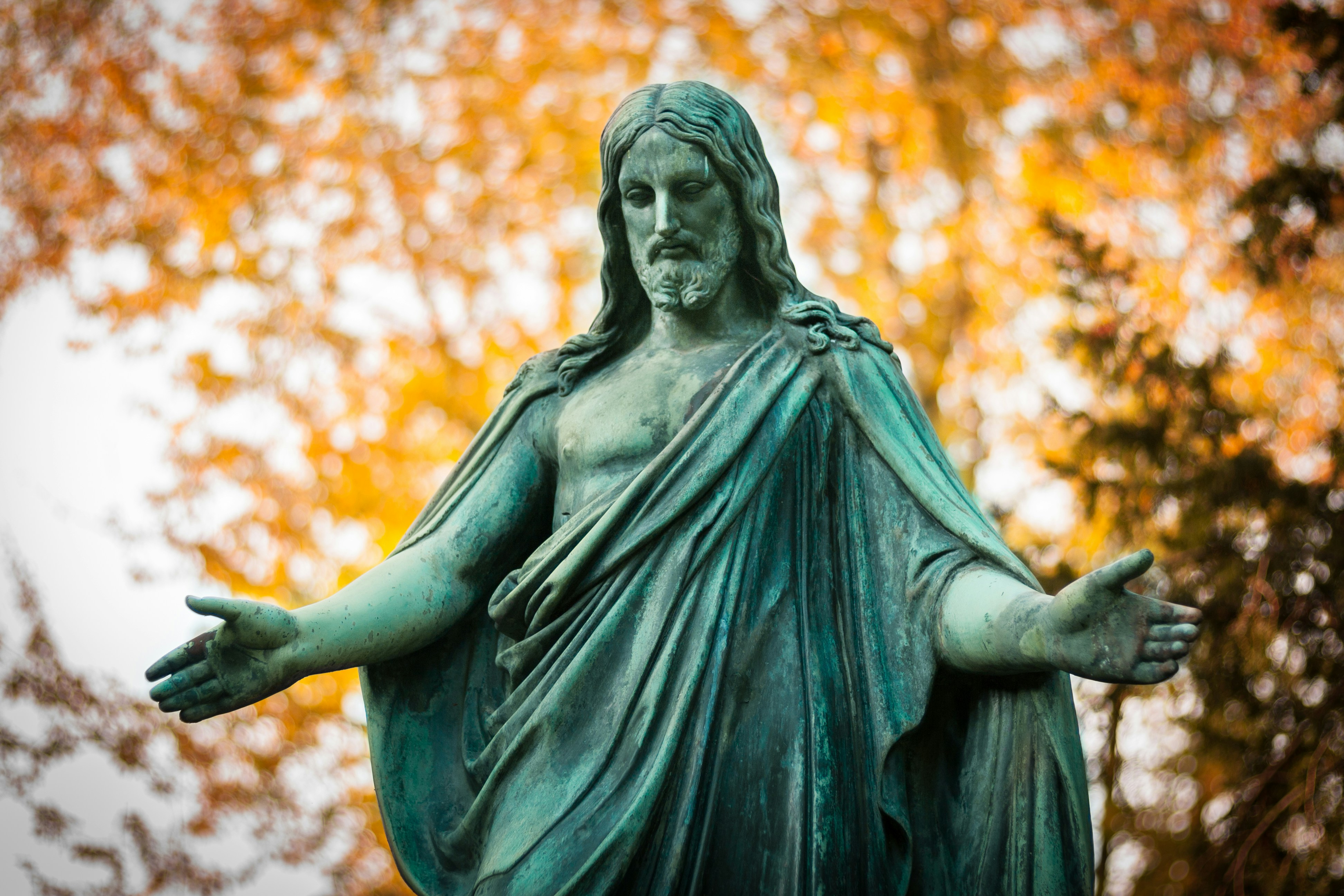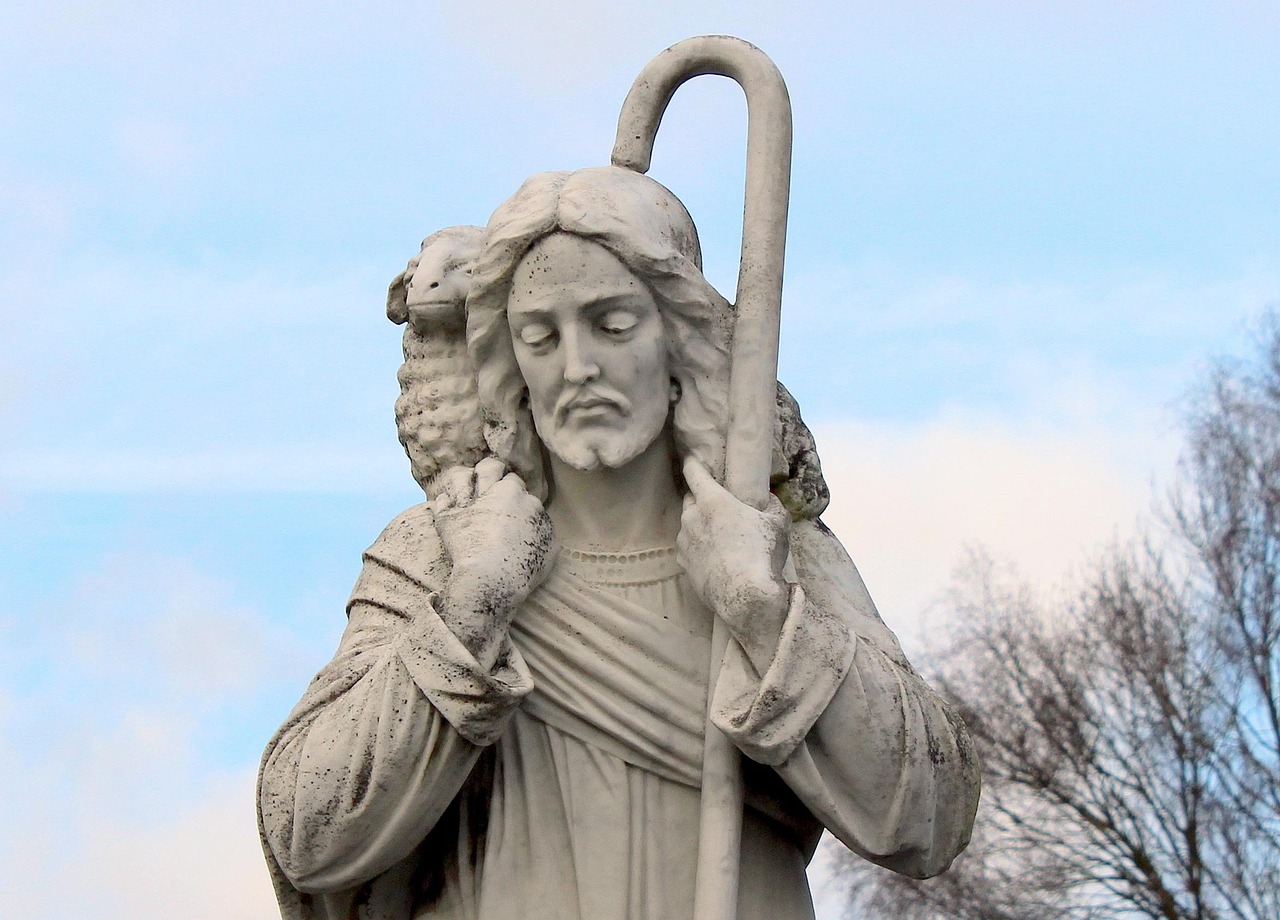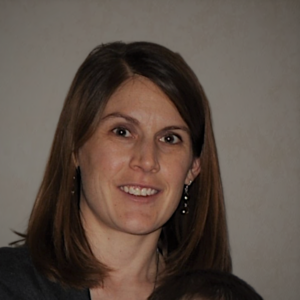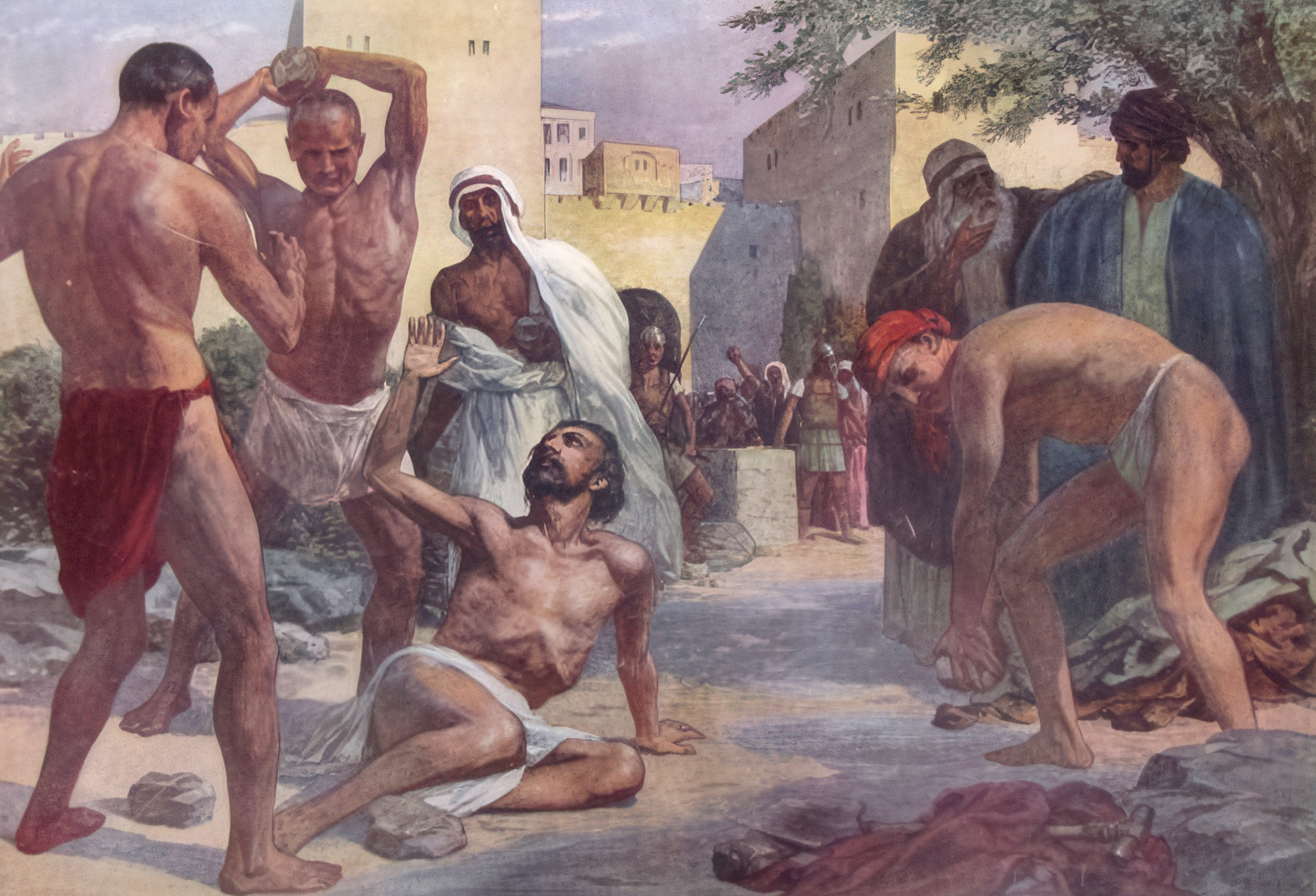This is one of those Gospel passages that can be intimidating to write reflections about because so much has been said already. A popular passage, especially for women, this Gospel story provides a quick sketch of how we ought to prioritize our time.
As I was reflecting on this reading, I was reminded of a podcast I listened to last year which was talking about a completely different topic, but this phrase stood out at the time and I’ve continued to ponder it: “If it’s raining, put down the bucket.” The story went like this: We are gardeners, working to tend to the garden of our lives. There is a lot of work to do, and one of the primary things needed is water. We can’t control the sunlight, but we can fill a bucket and bring it to our tender sprouts. But, if we get so wrapped up in filling our bucket and carting the water back and forth, we might not even notice when the mist starts to fall. As a gardener, there is nothing more to do at that moment; the rain has come. It is time for stillness. Put down the bucket and let the rain fall.
Applying these thoughts to our reading, Martha was a diligent gardener as she tended to her guests. She was so focused on the proverbial bucket, she neglected to notice the sustenance present.
I like this way of thinking of this story, because it acknowledges that work is good and necessary. If the gardener left the plants to their own devices, there is the risk the garden would fail. If we leave our spiritual lives to wander or lay fallow, we won’t progress far. We have work to do when it comes to study, prayer, service. However, we cannot forget that God is the master, and there will be times in our lives when we are asked to be still, to wait, to simply be in His presence. He will bring the rain needed to sustain this period.
But how can we know when to be still and when to work? Ecclesiastes tells us there is a time for everything, for work and rest, for laughter and sorrow. What is this moment for – is it for listening with my full attention to my child, or to ask them to wait while I finish preparing dinner so our family can eat on time. Is it to stay late at work because a colleague is in need, or to go home at my usual time to see my family.
None of these are easy questions and either answer could be correct. It takes prayer and practice to discern God’s will. Martha was doing good work. She was serving her guests, attending to their needs and caring for their physical wellbeing. But in that moment, Mary discerned the better choice by putting down her “bucket”, being still, and listening to Jesus’ every word.
Este es uno de esos pasajes del Evangelio sobre los que puede resultar intimidante escribir reflexiones porque ya se ha dicho mucho sobre ello. Este pasaje popular, especialmente entre las mujeres, ofrece un esquema rápido de cómo debemos priorizar nuestro tiempo.
Mientras reflexionaba sobre esta lectura, me acordé de un podcast que escuché el año pasado que hablaba de un tema completamente diferente, pero esta frase me llamó la atención en ese momento y he seguido reflexionando sobre ella: “Si está lloviendo, deja la cubeta en el suelo”. La historia era así: Somos jardineros, trabajamos para cuidar el jardín de nuestras vidas. Hay mucho trabajo por hacer, y una de las cosas principales que necesitamos es agua. No podemos controlar la luz del sol, pero podemos llenar una cubeta y llevarlo a nuestros tiernos brotes. Pero, si nos concentramos tanto en llenar la cubeta y llevar el agua de un lado a otro, es posible que ni siquiera nos demos cuenta de que comienza a caer la lluvia. Como jardineros, no hay nada más que hacer en ese momento; ha llegado la lluvia. Es tiempo de quietud. Dejemos la cubeta y dejamos que llueva.
Aplicando estos pensamientos a la lectura de hoy, Marta era una jardinera diligente mientras atendía a sus invitados. Estaba tan concentrada en la cubeta proverbial que descuidó notar el sustento presente.
Me gusta esta manera de pensar en esta historia, porque reconoce que el trabajo es bueno y necesario. Si el jardinero deja que las plantas se las arreglen solas, existe el riesgo de que el jardín fracase. Si dejamos que nuestra vida espiritual vague o quede en barbecho, no progresaremos mucho. Tenemos trabajo que hacer en lo que respecta al estudio, la oración y el servicio. Sin embargo, no podemos olvidar que Dios es el amo, y habrá momentos en nuestras vidas en los que se nos pedirá que estemos quietos, que esperemos, que simplemente estemos en Su presencia. Él traerá la lluvia necesaria para sostener este período.
Pero, ¿cómo podemos saber cuándo estar quietos y cuándo trabajar? Eclesiastés nos dice que hay un tiempo para todo, para el trabajo y el descanso, para la risa y la tristeza. ¿Para qué sirve este momento en particular? ¿Para escuchar con toda mi atención a mi hijo o para pedirle que espere mientras termino de preparar la cena para que nuestra familia pueda comer a tiempo? ¿Para quedarme hasta tarde en el trabajo porque un colega está en necesidad o para ir a casa a mi hora habitual para ver a mi familia?
Ninguna de estas son preguntas fáciles y cualquiera de las dos respuestas podría ser correcta. Se necesita oración y práctica para discernir la voluntad de Dios. Marta estaba haciendo un buen trabajo. Estaba sirviendo a sus invitados, atendiendo sus necesidades y cuidando su bienestar físico. Pero en ese momento, María discernió la mejor opción al dejar su “cubeta”, quedarse quieta y escuchar cada palabra de Jesús.
 Kate Taliaferro is an Air Force wife and mother. She is blessed to be able to homeschool, bake bread and fold endless piles of laundry. When not planning a school day, writing a blog post or cooking pasta, Kate can be found curled up with a book or working with some kind of fiber craft. Kate blogs at DailyGraces.net.
Kate Taliaferro is an Air Force wife and mother. She is blessed to be able to homeschool, bake bread and fold endless piles of laundry. When not planning a school day, writing a blog post or cooking pasta, Kate can be found curled up with a book or working with some kind of fiber craft. Kate blogs at DailyGraces.net.
Feature Image Credit: Bulat Khamitov, pexels.com/photo/woman-with-bucket-walking-along-river-5869751/
The views and opinions expressed in the Inspiration Daily blog are solely those of the original authors and contributors. These views and opinions do not necessarily represent those of Diocesan, the Diocesan staff, or other contributors to this blog.


 Mike Karpus is a regular guy. He grew up in Michigan’s Upper Peninsula, graduated from Michigan State University and works as an editor. He is married to a Catholic school principal, raised two daughters who became Catholic school teachers at points in their careers, and now relishes his two grandchildren, including the older one who is fascinated with learning about his faith. He also has served on a Catholic school board, a pastoral council and a parish stewardship committee. He currently is a lector at Mass, a Knight of Columbus, Adult Faith Formation Committee member and a board member of the local Habitat for Humanity organization. But mostly he’s a regular guy.
Mike Karpus is a regular guy. He grew up in Michigan’s Upper Peninsula, graduated from Michigan State University and works as an editor. He is married to a Catholic school principal, raised two daughters who became Catholic school teachers at points in their careers, and now relishes his two grandchildren, including the older one who is fascinated with learning about his faith. He also has served on a Catholic school board, a pastoral council and a parish stewardship committee. He currently is a lector at Mass, a Knight of Columbus, Adult Faith Formation Committee member and a board member of the local Habitat for Humanity organization. But mostly he’s a regular guy.
 Deanna G. Bartalini, M.Ed.; M.P.A., is a certified spiritual director, writer, speaker and content creator. The
Deanna G. Bartalini, M.Ed.; M.P.A., is a certified spiritual director, writer, speaker and content creator. The 


 Dr. Alexis Dallara-Marsh is a board-certified neurologist who practices in Bergen County, NJ. She is a wife to her best friend, Akeem, and a mother of four little ones on Earth and two others in heaven above.
Dr. Alexis Dallara-Marsh is a board-certified neurologist who practices in Bergen County, NJ. She is a wife to her best friend, Akeem, and a mother of four little ones on Earth and two others in heaven above.
 Kathryn Mulderink, MA, is married to Robert, Station Manager for Holy Family Radio. Together they have seven children (including Father Rob), and eleven grandchildren. She is President of the local community of Secular Discalced Carmelites and has published five books and many articles. Over the last 30 years, she has worked as a teacher, headmistress, catechist, Pastoral Associate, and DRE, and as a writer and voice talent for Catholic Radio. Currently, she serves the Church by writing and speaking, and by collaborating with various parishes and to lead others to encounter Christ and engage their faith. Her website is
Kathryn Mulderink, MA, is married to Robert, Station Manager for Holy Family Radio. Together they have seven children (including Father Rob), and eleven grandchildren. She is President of the local community of Secular Discalced Carmelites and has published five books and many articles. Over the last 30 years, she has worked as a teacher, headmistress, catechist, Pastoral Associate, and DRE, and as a writer and voice talent for Catholic Radio. Currently, she serves the Church by writing and speaking, and by collaborating with various parishes and to lead others to encounter Christ and engage their faith. Her website is 
 Lily is a Michigan native and cradle Catholic who has spent most of her life exploring her own reasons to embrace her faith fully. She attended Franciscan University of Steubenville, where she discovered the beauty of her personal relationship with Christ and the Church. After college, she worked in Montessori Education for three years and recently transitioned to nannying. She was recently married and spends most of her time reading, and enjoying her dog and family!
Lily is a Michigan native and cradle Catholic who has spent most of her life exploring her own reasons to embrace her faith fully. She attended Franciscan University of Steubenville, where she discovered the beauty of her personal relationship with Christ and the Church. After college, she worked in Montessori Education for three years and recently transitioned to nannying. She was recently married and spends most of her time reading, and enjoying her dog and family!
 Kimberly Andrich writes from the perspective of having a hidden, chronic illness and experiencing a deep, continuous conversion through being yoked to Jesus in the day-to-day trials and joys of life. She is a wife, mother of 5, and daughter of the King. Kimberly also writes for
Kimberly Andrich writes from the perspective of having a hidden, chronic illness and experiencing a deep, continuous conversion through being yoked to Jesus in the day-to-day trials and joys of life. She is a wife, mother of 5, and daughter of the King. Kimberly also writes for 
 Colleen Orchanian is a podcaster, blogger, and spiritual director who desires to help others have a more profound encounter with God. She is the author of three books: Nearer My God to Thee, Times of Grace, and Lingering with God. Her podcast is Food for Thought (Spiritually Speaking). You can learn more at
Colleen Orchanian is a podcaster, blogger, and spiritual director who desires to help others have a more profound encounter with God. She is the author of three books: Nearer My God to Thee, Times of Grace, and Lingering with God. Her podcast is Food for Thought (Spiritually Speaking). You can learn more at 


 Ben Hooper is originally from Maryland, having been adopted from Korea and growing up in the Catholic faith. He went to Franciscan University to dive deeper into his faith and eventually graduated with a degree in Business Management. He loves musical theater, sports, spending time with his wife Lily and their dog Kolbe.
Ben Hooper is originally from Maryland, having been adopted from Korea and growing up in the Catholic faith. He went to Franciscan University to dive deeper into his faith and eventually graduated with a degree in Business Management. He loves musical theater, sports, spending time with his wife Lily and their dog Kolbe.
 Tami Urcia is a midwestern gal from a large Catholic family. As a young adulthood she was a missionary in Mexico, where she studied theology and philosophy. After returning stateside bilingual, she gained a variety of work experience, traveled extensively and finished her Bachelor’s Degree at Brescia University. She loves organizing and simplifying things, watching her children play sports, deep conversations with close family and friends and finding unique ways to brighten others’ day with Christ’s love. She works full time at Diocesan in the Software Department and manages the Inspiration Daily reflections. She is also a contributing writer on
Tami Urcia is a midwestern gal from a large Catholic family. As a young adulthood she was a missionary in Mexico, where she studied theology and philosophy. After returning stateside bilingual, she gained a variety of work experience, traveled extensively and finished her Bachelor’s Degree at Brescia University. She loves organizing and simplifying things, watching her children play sports, deep conversations with close family and friends and finding unique ways to brighten others’ day with Christ’s love. She works full time at Diocesan in the Software Department and manages the Inspiration Daily reflections. She is also a contributing writer on 